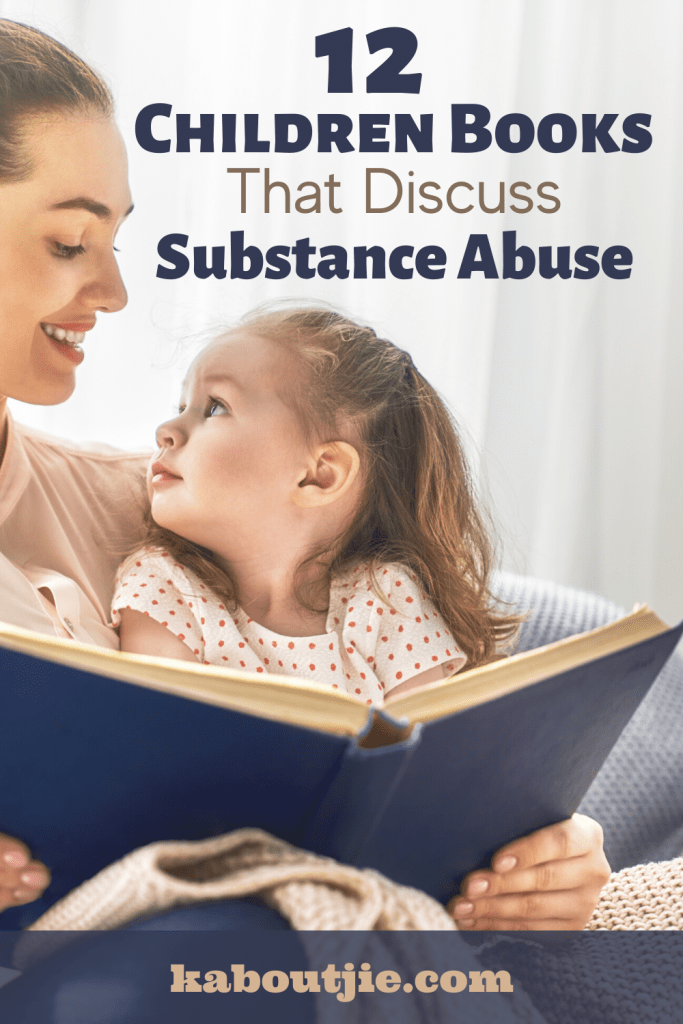Substance abuse and addiction can be such a difficult topic to discuss with kids, especially when they are facing confusing and hurtful circumstances related to a parent’s or sibling’s addiction.
“As an addiction treatment professional, a person in recovery, and a father, I know from personal experience how important it is to talk with your children about addiction. However, it’s also an extremely delicate topic to discuss with a young person who has a sensitive mind and heart, so it’s important to be very thoughtful about how you approach the discussion,” says Mathew Gorman, CEO of Briarwood Detox Center.
Discussing the difficult aspects of addiction and substance abuse with young children in an appropriate way can be very challenging, but by being honest and upfront with your children, you can help them learn how to understand their feelings so they can cope, communicate, and heal from their experience with addiction early in life.
Children’s books can be excellent resources and tools for parents who are searching for a way to start a conversation with their children about addiction. Not only are books very engaging for children of all ages, but they also often include vivid illustrations that can add to the overall meaning and understanding of the topic at hand.
If your family is in the midst of an addiction crisis and you’re struggling to find the words to talk with your children in an age-appropriate way, these 12 children’s books provide great opportunities to start the conversation and invite your children to share their thoughts and feelings.
***Disclosure -The links in this post may contain affiliate links and I may receive a small commission if you make a purchase after clicking on a link.***

In this children’s book, addiction takes the form of Al the dragon, who seems fun and harmless at first. As Al and Dad become great friends, the dragon takes up residence at the house, leaving no room for the rest of the family. Al grows bigger and Dad spends all his time with him, leaving no room for anyone else in the family. Finally, Dad goes to a place called “treatment” where he stays for a little while. In the end, the family has renewed hope because Al has gotten smaller and Dad is committed to working a few simple steps to make sure he doesn’t grow big and take over their lives again. Written in a way that young children can easily process, this beautifully illustrated book is appropriate for young children and it’s a good way to talk with your kids about the harmful effects of addiction on a family.
This book is ideal for children ages six to nine. It provides a more abstract take on describing what it feels like to have an alcoholic parent. It tells a fictional story from the perspective of a little girl whose mother is an alcoholic. The illustrations are simple but they help convey the story in a way that a young child can easily understand, even though the little girl experiences some very complex emotions throughout. Reading through this book is a great opportunity for children who live in alcoholic homes to see that they are not alone and that their parent’s behavior is not their fault. One of the biggest takeaways for kids is that although they can’t control someone else’s behavior, they can control their own happiness.
While this book doesn’t discuss addiction directly, it does clearly illustrate to young readers how experiencing a traumatic event (such as seeing something violent or experiencing something emotionally painful like addiction) can affect people physically. The book opens with Sherman the raccoon seeing something terrible. The author never explicitly says what Sherman saw that made him feel bad, but as the story continues from page to page, children will see how the experience makes him feel and behave. Once Sherman talks to a counselor about his emotions, he feels so much better and can enjoy life again. Most importantly, the author makes sure to stress that what Sherman saw was not his fault. This is a great lesson for children who may be exposed to trauma or violence due to addiction in the family. The final pages of this book also include a detailed conversation guide that parents and caregivers can use to start a healthy discussion with a child.
Used by the Betty Ford Clinic, this children’s book is a simple story that is written from the perspective of a boy who is growing up in an alcoholic home. Both the art and the story are easy to digest and understand, and it serves as an excellent introduction to the disease of addiction, which can be difficult for children and adults alike to understand. Aside from clearly showing young readers how alcoholism can affect families, one of the best things about this book is that it sincerely validates the complex feelings and emotions that many children of alcoholics feel while also reminding them that they are still very much loved despite what’s going on.
This book is Meg’s story about dealing with her dad’s alcoholism. All she wants is to make a friend but moving so frequently to accommodate her father has made things difficult. When she arrives in a new town and connects with another girl at school named Grace, Meg can’t help but tell outrageous stories about her family to hide the fact that she’s facing serious problems at home. Her lies eventually grow bigger and bigger until she’s so tangled up in them that she can’t find her way back to the truth. Ideal for kids ages eight to 12, this book by Karen Day is extremely relatable, especially for kids who may have a parent or older sibling that is struggling with addiction. It’s also a great lesson on what true friendship is.
Mila, the main character and narrator of this children’s book, lives with her dad. Her parents recently separated and she doesn’t quite understand why her mom acts weird sometimes. One night, Mila’s mom doesn’t show up for a scheduled outing and she is hurt and confused. Her dad explains to her that mommy has a disease and it affects the way she thinks and behaves. Although the experience is confusing for Mila, her dad assures her that she did nothing wrong and that her mommy still loves her. The author, a licensed professional counselor who specializes in treating people who suffer from the adverse side effects of addiction, breaks down the complex topic of addiction into digestible chunks that are easy to understand. Although the book may be a little long for young readers, it can easily be broken up into sections that you can read with your child over several days.
This book is appropriate for preschool children or first graders and it’s about a young girl who has a very disappointing Christmas Day. Her dad has a drinking problem and the girl is confused, angry, and upset that he is ruining Christmas. She just wishes they could have a normal holiday like other families. He is irritable, won’t take her sledding as he promised, and he didn’t even look at the beautiful Christmas card she made for him. In the end, she and her mommy find a way to make the best of the situation by taking their Christmas dinner to a friend’s house down the road. Although the girl wishes her daddy’s behavior wasn’t so confusing, her mom reassures her that daddy’s sickness is not her fault, she can’t control it, and she can’t cure it. Only he can get help when he’s ready. The somewhat happy ending to this book is realistic and encourages young readers to share their own feelings and frustrations about a loved one’s alcohol abuse.
Stoney the Pony is a horse that loves peppermint candies. He just can’t stop eating them! He gets so preoccupied with them, that his behavior starts to change. He’s no longer the Stoney that everybody knows and loves. Eventually, his friends step up to help him get the support he needs to get better and his story has a happy ending. It can be hard for young children to understand what addiction is and how it affects the people they love, but books like this one make explaining the disease and its impact so much easier. As a parent, it’s important to follow the talking points listed throughout the book to make the most of an educational opportunity, but you may also want to remind your child that although addictions can be overcome, a person often needs a lot of help and support. Unfortunately, not everyone’s story has a happy ending like Stoney’s.
Written for children ages four to 12, this workbook is an excellent tool for children who are already in counseling or who attend group meetings for therapy. It is a longer workbook but can be completed at the child’s own pace. It includes simple imagery and age-appropriate language to help children understand what addiction is, that they are not to blame for their addicted parent’s behavior, and how substance abuse can impact a family unit. By completing creative and fun exercises and activities, children can learn to apply healthy coping strategies to deal with complex situations and emotions that they may face.
This book tells a realistic foster care story that many children can relate to and it’s a great learning tool for kids ages five to nine. The story focuses on the lives of two young children, BeeBee and her brother Johnson. They are removed from their home and temporarily placed with their Aunt Gracie. At first, the two kids are very uncertain about this change and they worry about their mother also. They wonder if they’ll ever see her again. However, with time, they come to know their Aunt Gracie and find that she is a very loving and patient caregiver, which is exactly what they needed.
If you’re looking for a book that’s intended for young teens, ages 12 to 16, this is an excellent resource. The author, who is in recovery himself, packed this book full of helpful tools, including suggestions on how to helpfully intervene, what it means to enable someone, why a person doesn’t have to hit rock bottom before going to drug rehab, and the importance of having hope and faith in recovery. He even tackles complex topics like why a parent might leave their children and family amid drug or alcohol addiction. If your young teen has complicated questions about what’s going on at home or in a friend’s household, this book can provide clear answers and solid guidance.
A great read for young teens who are dealing with family dysfunction due to alcoholism and/or divorce, this graphic novel very clearly depicts the ups and downs of living with an addicted parent. Through beautiful illustrations and text, the main character, Louis, communicates some very complex emotions while dealing with truly challenging subject matters like divorce, alcoholism, young love, and changing family dynamics.
Navigating the difficult topic of drug and alcohol addiction is challenging but saying nothing should not be an option. By avoiding the issue, trying to cover things up, or attempting to make life circumstances kinder, parents can inadvertently leave their children more vulnerable to misinterpretation, shame, and misunderstanding later in life.
Books like these can never be a replacement for one-on-one conversations with parents and caretakers, but children who experience the effects of substance abuse in the family can greatly benefit from reading these titles with a loved one. By reading these books with your kids, you can guide children through the complex topic of addiction and help them unpack their emotions, ultimately giving them the tools they need to fully understand addiction, cope with it, and heal from the damage it causes.

 Author bio:
Author bio:
Kelsey Brown is an Austin-based writer. She received her B.S. in Journalism from Missouri State University and writes about addiction recovery, health, and well-being for Nova Recovery Center. In her spare time, Kelsey enjoys doing outdoor activities with her family like hiking, camping, and kayaking.

 Kaboutjie SA Mommy Blogs by Lynne Huysamen
Kaboutjie SA Mommy Blogs by Lynne Huysamen

















I think this is great! I feel that if more children were aware of these type of things, there would be less “experimenting” when they are older. The main thing that I learned as a child and teenager – if my parents forbade something – I wanted to know more about it and that’s were rebelliousness comes in and children start going behind their parents backs to learn about these things. If we could teach them from a young way in a controlled environment and in the age appropriate manner like these books i bet a lot less lives would be lost due to partying, drinking and doing drugs etc.
You sound exactly like I was a teenager Jannelene, if my parents told me not to do something I would immediately add that to the top of my to do list! I believe that the key is about educating our children properly. As an addict and alcoholic close to my 12 year clean milestone I educate my children regularly about addiction.
Books are a valuable tool when it comes to teaching our kids about difficult topics, thanks for these brilliant suggestions – they all look fantastic.